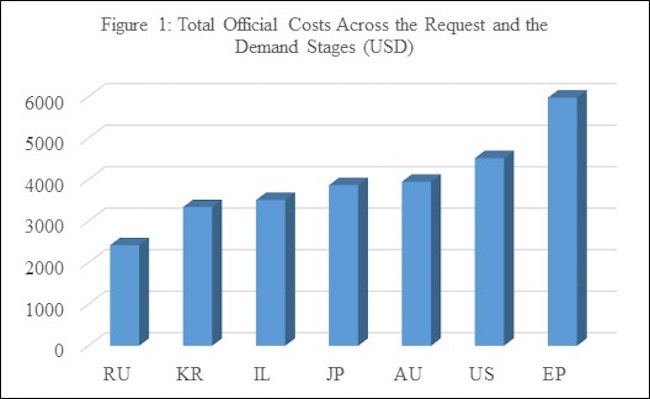 A PCT application is an international application that is filed under the Patent Cooperation Treaty (PCT), which currently has 151 contracting states. A PCT application is filed with an appropriate Receiving Office within 12 months from the date of first filing (where applicable). The main advantage of a PCT application is that an applicant generally gets 30/31 months from the date of first filing to file individual National Phase applications in jurisdictions of interest.
A PCT application is an international application that is filed under the Patent Cooperation Treaty (PCT), which currently has 151 contracting states. A PCT application is filed with an appropriate Receiving Office within 12 months from the date of first filing (where applicable). The main advantage of a PCT application is that an applicant generally gets 30/31 months from the date of first filing to file individual National Phase applications in jurisdictions of interest.
The PCT process can be broadly classified into two stages: namely, the mandatory Request stage (Chapter I); and the optional Demand stage (Chapter II). While the former involves an International Searching Authority (ISA) that issues an International Search Report (ISR) and a written opinion, the latter involves an International Preliminary Examining Authority (IPEA) that issues an International Preliminary Examination Report (IPER). Nineteen patent offices across the globe have been appointed by the World Intellectual Property Organization (WIPO) to function as ISA and IPEA. However, the choice of ISA and IPEA available to an applicant depends on the applicant’s country of nationality or residence.
The ISR contains a list of documents that the ISA considers to be relevant to the disclosed invention. The documents are listed by category; the “X” and the “Y” categories are particularly important and relate to documents that destroy the invention’s novelty or inventive step. In “X”, a document on its own is considered to be relevant; while in “Y”, a document is considered to be relevant when it is combined with one or more other such documents, such combination being obvious to a person skilled in the art.
The main advantage of the ISR is that an applicant gets an idea of what documents are relevant to the disclosed invention. At the time of National Phase entry, a national patent office may cite one or more of the documents that are cited in the ISR. Further, an applicant gets an opportunity to amend the claims in response to the ISR.
Chapter II of the PCT allows the applicant a second bite at the cherry. A negative ISR followed by a positive IPER means that the applicant’s arguments in response to the ISR and/or claim amendments have been viewed favorably by the IPEA. Further, an applicant gets the opportunity to amend the claims, the description, and the drawings in response to the IPER.
Both the Request stage and the Demand stage have various types of costs associated with them. A transmittal fee, a search fee, and an international fee are associated with the Request stage, while an examination fee and a handling fee are associated with the Demand stage. The exact amounts to be paid depend on the Receiving Office, the ISA, and the IPEA. The Receiving Office is usually either the patent office of the PCT contracting jurisdiction of which the applicant is a resident or a citizen, or the International Bureau of the WIPO.
Let us consider a 40-page application (excluding six pages of the PCT Request form) with 15 claims (including three independent claims), five pages of drawings, and filed electronically by a large entity. We will use the U.S. Patent and Trademark Office (USPTO) as the Receiving Office, for this example.
Depending on the ISA and the IPEA, the estimated official costs incurred in the Request stage vary from $2,058 (the “Rospatent”/Federal Service for Intellectual Property, aka the Russian Patent Office, as the ISA) to $3,735 (the European Patent Office as the ISA), while those in the Demand stage vary from $369 (the Rospatent as the IPEA) to $2,245 (the “EPO” as the IPEA) (Table 1).
Thus, the total official costs across both the stages vary from $2,427 (the Rospatent as the ISA and the IPEA) to $5,980 (the EPO as the ISA and the IPEA) (Figure 1).

The above-mentioned fees are for electronic filing with ePCT or PCT-EASY .zip file. The international fee increases by $103 and $205 for an electronic filing without ePCT or PCT-EASY .zip file and non-electronic filing respectively.
Though the total official costs seem to be high when the EPO is the ISA and the IPEA, an applicant can avail the benefit of the European search fee of $1,180 being waived at the time of filing a National Phase application with the EPO. Further, the applicant is also entitled to a 50% reduction in the examination fee (savings of ~$850), which leads to a total savings of ~$2,000. Likewise, the search and examination fee at the time of National Phase entry into the U.S. is reduced from $1,200 to $840 if the USPTO is the ISA and the IPEA.
It is to be noted that some of the patent offices mentioned above have limitations on their competency to act as an ISA. For instance, the Australian Patent Office (“IP Australia”) can act as an ISA only for “250 international applications from the USPTO during a fiscal quarter.” Likewise, the Israel Patent Office can act as an ISA only for “75 applications per fiscal quarter.” Moreover, the Israel Patent Office will not act as an ISA for “applications with one or more claims directed to the field of business methods as determined through classification G06Q of the International Patent Classification.” For international applications that are filed in English and that relate to the field of green technology, the Japan Patent Office (“JPO”) can act as an ISA, provided the JPO has not received more than “5,000 international applications from the USPTO during the three-year period from 1 July 2015 to 30 June 2018, not more than 300 applications per quarter during the first year, and not more than 475 applications per quarter during the second and third years.”
There are no limitations on the competency of the EPO, the Korean Intellectual Property Office, and the Rospatent to act as an ISA for international applications that are filed with the USPTO as the Receiving Office.

![[IPWatchdog Logo]](https://ipwatchdog.com/wp-content/themes/IPWatchdog%20-%202023/assets/images/temp/logo-small@2x.png)


![[Advertisement]](https://ipwatchdog.com/wp-content/uploads/2024/04/Patent-Litigation-Masters-2024-sidebar-early-bird-ends-Apr-21-last-chance-700x500-1.jpg)

![[Advertisement]](https://ipwatchdog.com/wp-content/uploads/2021/12/WEBINAR-336-x-280-px.png)
![[Advertisement]](https://ipwatchdog.com/wp-content/uploads/2021/12/2021-Patent-Practice-on-Demand-recorded-Feb-2021-336-x-280.jpg)
![[Advertisement]](https://ipwatchdog.com/wp-content/uploads/2021/12/Ad-4-The-Invent-Patent-System™.png)







Join the Discussion
No comments yet.